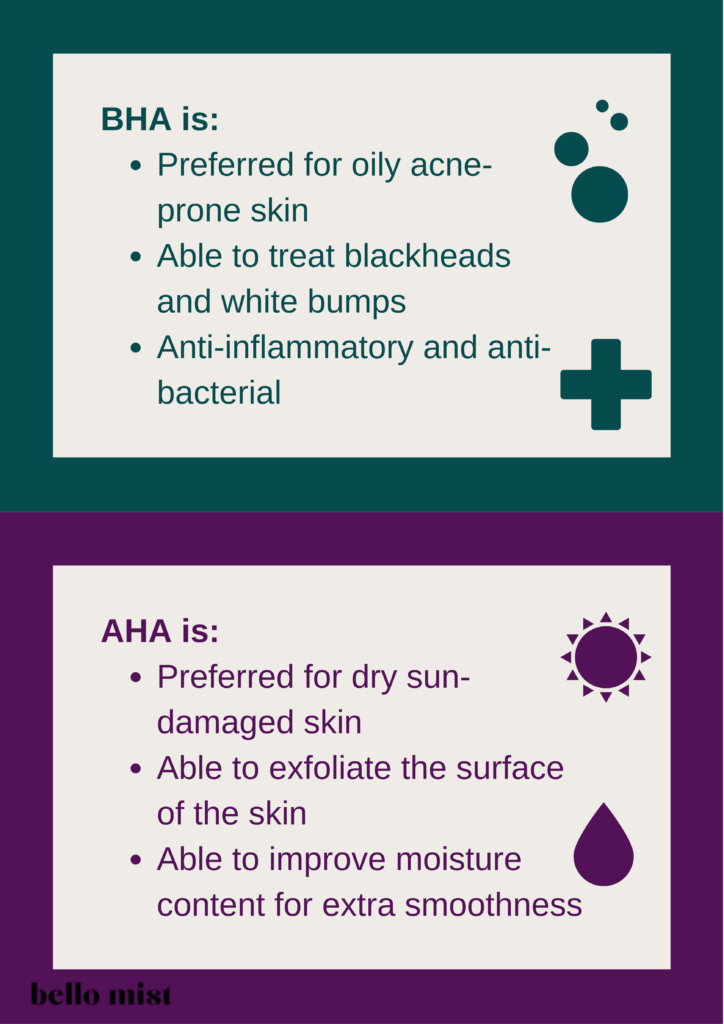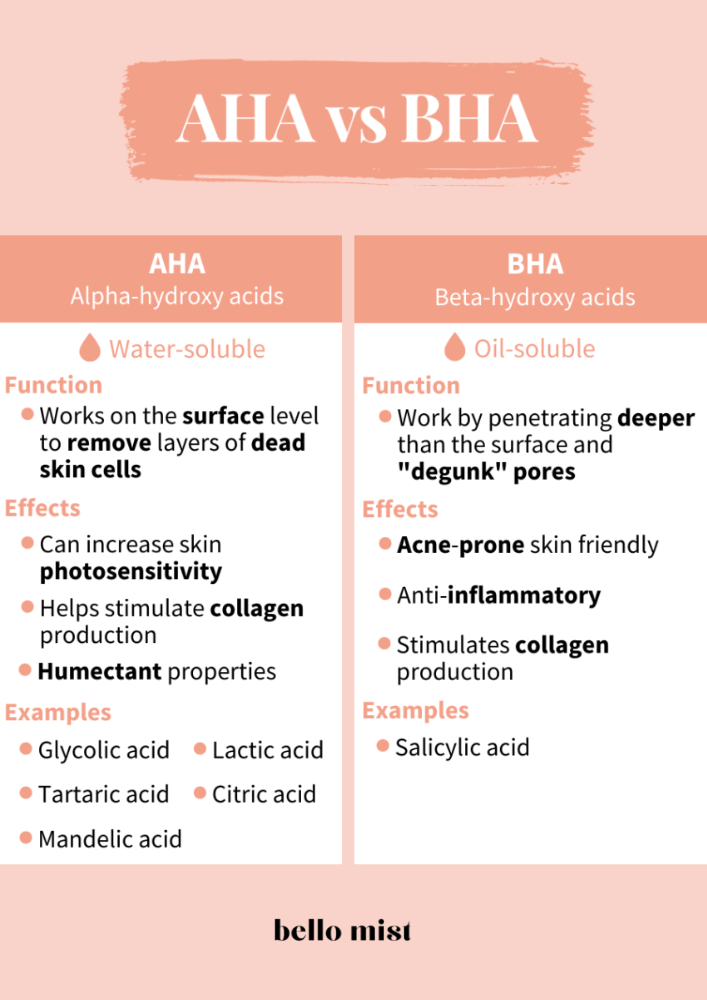Can you use BHA with retinol to achieve maximum skincare benefits? Let’s find out.
Using too many products is not the answer when taking care of your skin. We know how tempting it is to layer on a bunch of skincare products with the hope that you’ll wind up with softer and brighter skin, but that can lead to irritation.
Specific pairings, like benzoyl peroxide and salicylic acid, are not typically recommended. However, one combination that can do wonders for your skin is salicylic acid (BHA) and retinol.
Now is the ideal time to use this duo for a few reasons, and we’ll explain why and how it can help, depending on your skin’s needs.
What are BHA, AHAs, and retinol?

Before learning can you use BHA with retinol, let’s understand what they are first.
AHAs and BHAs are chemical exfoliants for the skin which come from hydroxy acids.
AHA stands for ‘alpha-hydroxy acid’ and includes lactic, citric, glycolic, and mandelic acids, all of which come from fruits with high sugar content.
BHA stands for ‘beta-hydroxy acid,’ with salicylic acid being the most popularly used. Willow bark extract, tropic acid, and sodium salicylate are also forms of BHAs.
Retinol is a type of vitamin A, often found in serums and creams, and is both natural and synthetic. Vitamin A is an antioxidant, so it’s great for your skin.

What do these products do to your skin?
Before learning can you use BHA with retinol, let’s understand how these products affect your skin.
AHAs and BHAs are chemical exfoliants that break up bonds on the skin’s surface, enabling dead skin cells to be removed without manual scrubbing. Furthermore, hydroxy acids are effective at eliminating bacteria and boosting skin cell regeneration.
Both retinol and hydroxy acids can help improve the skin’s texture, diminishing the size of pores, lightening dark spots, and softening wrinkles and fine lines.
AHAs work on the skin’s surface to reveal a brighter tone and smoother texture. These water-soluble compounds are commonly present in water-based skin products, perfect for people with normal to dry skin.
BHAs can penetrate both the surface and inner layers of the skin. These oil-soluble ingredients can provide relief and calming effects and help reduce inflammation.
Beta-hydroxy acid clears out blockages in the pores, resulting in a more clarified complexion, particularly for those with oily skin.
Retinol is an antioxidant that reverses the effects of early aging by increasing skin cell production at a deeper level. Sometimes, this may cause the outer layers of the skin to flake off.
Numerous studies have demonstrated that retinol can successfully tackle acne, photoaging, hyperpigmentation, and even minimal scarring caused by pimples. Now let’s find out can you use BHA with retinol.

How does BHA and retinol work together?
Can you use BHA with retinol? It’s widely believed that BHA and retinol don’t combine well, but the truth is they complement each other.
BHA is a skin exfoliator that eliminates dead skin cells and creates a path for other active ingredients to penetrate deeper. If you apply BHA before retinol, it could be more effective.
On the other hand, retinol can improve BHA’s performance as it increases cell turnover and reduces the likelihood of dead skin cells blocking pores. So, Can you use BHA with retinol? Yes, it’s an excellent team for your skin.
Let’s tackle one more misconception: BHA acid isn’t so powerful that it reduces the skin’s pH until retinol can no longer be effective. There needs to be more evidence to prove that point, but numerous studies demonstrate the power of combining retinol and acids.
Although combining acids and retinol isn’t always ideal, you can still incorporate them into your skin care regimen. Just be sure to use them at the correct times and sequence to avoid inflammation and get the most out of them.
In the morning, use BHA to eliminate any dead skin cells. You should apply retinol in the evening since it is susceptible to sunlight and can make your skin more vulnerable to sunburn.

Who should use BHA and retinol together?
After learning can you use BHA with retinol, let’s find out who should use this combination.
Those with oily skin, pimples, or clogged pores often opt for a combination of BHA and retinol to tackle their issues.
Salicylic acid is an ideal comedolytic ingredient as it is oil-soluble and can effectively make its way into skin pores to provide gentle exfoliation and do away with excessive oils.
Retinoids are also excellent for fighting acne since they can expedite the turnover of skin cells and reduce the chances of clogged pores.
Together, these two ingredients are a powerful duo that can help refine any skin type and unclog pores.

Can you use BHA with retinol at the same time?
Can you use BHA with retinol at the same time? The answer is a definite yes. People with oily skin that is not easily irritated can use this combination of products daily.
However, if you have dry or sensitive skin, you’ll need to be mindful of when you apply them and adjust your routine accordingly.
You can alternate between BHA in the morning and retinol at night, or you can use retinol nightly and add BHA to your routine twice or thrice a week.
Can you use AHA with retinol together?
For both BHA and AHA, the same guidelines for using retinol apply. In truth, some people even opt for all three.
It’s essential to remember to apply them at various periods of the day to allow your skin to absorb the product and regenerate before you use the next product.

Can you use Vitamin C and retinol together?
After learning can you use BHA with retinol, you may want to know about the combination of retinol with vitamin C.
It is often claimed that you should not use vitamin C (in any form) together with retinol. This assumption is due to the pH/acidity of the products.
However, the truth is that Vitamin C, depending on its form, needs either a low acidity or no pH to remain stable.
We know that retinol works optimally in an acidic environment and that our skin’s pH is naturally acidic, so there is no issue pairing Vitamin C and retinol.
Moreover, research has revealed that when retinol and vitamin C are combined, it can be very beneficial for the skin.
It defends the skin against free radicals and enhances the anti-aging effects of retinol. Additionally, vitamin C helps in protecting retinol from oxidation as it penetrates the skin.
Can you use retinol and niacinamide together?
After learning can you use BHA with retinol, you may want to know about the combination of retinol with niacinamide.
Dermatologists commonly suggest using retinol and niacinamide together as they both have distinct yet cooperative benefits.
Research has determined that these compounds work in conjunction to reduce the visibility of wrinkles, shrink enlarged pores, and even out skin tone. Merging these two components is sure to create excellent results.

Source
Does retinol work better without BHA or AHA exfoliants?
The answer is no. Studies have indicated that retinol and exfoliants can help diminish hyperpigmentation in the skin and increase the effectiveness of both ingredients.
The idea that the skin’s pH can nullify skin care products’ acidity is inaccurate. Contrary to the single study that is frequently cited, the skin’s pH is more acidic than previously thought, usually between 4.7 and 5.
Does this mean you need to adjust the skin’s pH to use retinol? Absolutely not. Research has revealed that retinol works well even when applied at the skin’s natural acidity.

When should you use BHAs, AHAs, and retinol?
After learning can you use BHA with retinol, you may want to know about the right time to use these products.
Research in the lab has shown that hydroxy acids and retinol may not be as effective when used together. People are still figuring out if this can be seen in the real world, but using them apart can ensure you’re getting the most out of each.
Making hydroxy acid your morning go-to can help eliminate dead skin cells and give you a perfect canvas for makeup. Always put on sunscreen after exfoliating your skin to be safe. If you’re new to exfoliation, start with every other day until your skin gets used to the product.
Be mindful when using prescription-strength retinol, as it can become more susceptible to sunburn when exposed to sunlight.
To be safe, more robust retinol products should always be used during the night, although it is possible to use certain over-the-counter retinol products as long as a high SPF sunscreen is worn.
As an alternate approach, you can use hydroxy acids and retinol on alternate nights to avoid any irritation. Remember to take a break and offer your skin a night off with a moisturizer.
You may also use hydroxy acids and retinol consecutively. After applying an AHA or BHA product, wait for 30 minutes and then go ahead and use the retinol product.

Why should you use BHA and retinol right now?
In these times, when most of us are stuck inside, it’s an ideal opportunity to get those skin-care routines that we have been avoiding taken care of.
However, if you’re new to BHA or retinol, you may go through a skin purging phase. This means that the heightened rate of cellular regeneration is causing a build-up of dead skin cells on the surface, leading to clogged pores.
Additionally, blemishes that were under the skin may start to appear more quickly. During this adjustment period, you may find yourself with more red bumps and whiteheads or blackheads.
For the most part, retinol is known to make skin more vulnerable to sun rays, which is why many suggest not using it during the spring and summer.
Retinol enhances the risk of sun damage, but it is worth remembering that skin is naturally prone to aging and burns, even without retinol. To be safe, wear sunscreen with an SPF rating of 30 or higher and reapply it as necessary.
So, can you use BHA with retinol when spending time indoors? If you’re spending time indoors, it’s an excellent opportunity to try retinol and BHA.

Wrapping Up
So, can you use BHA with retinol? Absolutely. Contrary to popular belief, a combination of acidic ingredients will not hinder the effectiveness of retinol. There’s a ton of research out there that supports the opposite.
Skincare experts who are exceptionally knowledgeable about formulating retinol-based products rejected the idea that retinol and BHA do not work together.
Therefore, you can use retinol and BHA to get the most out of your skincare routine.
Read More
How to use CeraVe skincare products for maximum benefits.
Is CeraVe good for oily skin? An in-depth review.
Is Cetaphil good for acne? Complete & Honest Review.
CeraVe or Cetaphil: Which is better? [2023]
